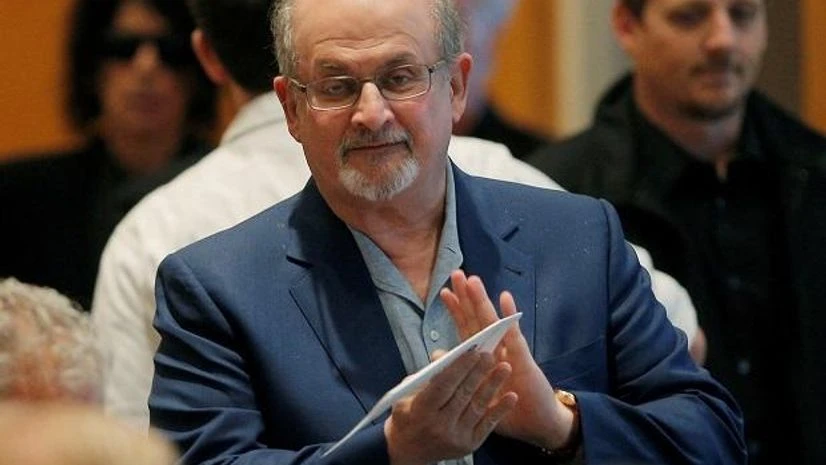Shocked over the attack on Salman Rushdie, the literary world on Saturday spoke in unison against the violence and stressed upholding freedom of speech while wishing a speedy recovery to the Booker Prize-winning author.
The Mumbai-born controversial author, who faced Islamist death threats for years after writing 'The Satanic Verses', was stabbed by a 24-year-old man on Friday while he was being introduced at an event in New York in the US.
Geetanjali Shree, the first Indian to join the esteemed club of International Booker-winning authors, described the attack on Rushdie as an "inexcusable and inhuman" act.
"Where is humanity going? A day of such distress, such shame. We pray for the fast recovery of this votary of democracy and freedom of speech. Violence must not be allowed to become the way of dealing with difference of opinion," Shree told PTI.
Shree was in news last month when an event to honour her in Agra was cancelled following a controversy over the content of her award-winning novel "Ret Samadhi" which was translated into English as "Tomb of Sand".
Though the motive behind the attack on Rushdie is yet to be ascertained, it is widely suspected that it has got to do with his controversial novel "The Satanic Verses".
More From This Section
The 1998 novel, which earned Rushdie a Whitbread Book Award, forced him into hiding for nine years as a massive controversy erupted after the release of the book with several Muslims seeing it as blasphemous.
A year after the book's publication, Iran's Supreme Leader Ayatollah Ruhollah Khomeini called for Rushdie's execution for publishing the book for its blasphemous content.
Since the 1980s, Rushdie's writing has led to death threats from Iran, which has offered a USD 3 million reward for anyone who kills him. India, under the Rajiv Gandhi-led government, had banned the book.
Put under police protection in Britain after the issuance of the fatwa, Rushdie spent the most part of the next decade in hiding before the government of Iran in 1998 declared that it no longer backed the fatwa.
He has recounted the experience in his 2012 memoir "Joseph Anton", named after his alias while in hiding.
But the fear of living under constant threat, as felt by Rushdie, can be possibly understood by exiled Bangladeshi author Taslima Nasreen.
The 59-year-old author, who has been living in exile for the last 27 years after the ban of her book "Lajja" and subsequent fatwa for allegedly offending religious sentiments, posted a string of tweets condemning the attack on Rushdie.
She expressed fear for the life of anyone critical of Isalm across the world.
"I just learned that Salman Rushdie was attacked in New York. I am really shocked. I never thought it would happen. He has been living in the West, and he has been protected since 1989. If he is attacked, anyone who is critical of Islam can be attacked. I am worried," she tweeted.
Sanjoy K Roy, the producer of the Jaipur Literature Festival (JLF) that grabbed headlines in 2012 for the proposed visit of Rushdie and the subsequent protests, said, "It is not an attack on a writer but on a civilization and shows the vulnerability of anybody who presents a different narrative from the one that's acceptable".
"Violence has become acceptable, be it in America, Europe or wherever, and that is sad," Roy told PTI.
Recalling how "politics, violence and mob mentality" made it impossible for them to host Rushdie at JLF in 2012, the festival co-director and noted author Namita Gokhale said his books remain a seminal influence on contemporary South Asian writing and "this barbaric act cannot silence his creative voice".
Rushdie, who visited the JLF in 2007, and was set to attend the festival in 2012 as well, eventually had to pull back citing protests from Muslim organisations and intelligence inputs by the host state Rajasthan. Even his scheduled video address had to be cancelled following threats to the festival.
"His presence at the JLF was thwarted by politics, and the violent mob mentality of those who had perhaps not even read the book made it impossible for us to host him. We salute his courage and literary genius," she told PTI.
The who's who of the literati world, including eminent authors Neil Gaiman, Amitav Ghosh, Stephen King, and Jean Guerrero took to Twitter showing solidarity with Rushdie and wishing him a speedy recovery.
"I fervently hope that Salman Rushdie pulls through. He's funny, brilliant, and dry, he has written beautiful wise books and I wish the people who think they hate him would read his words. (You don't hate Salman, who is a real person. You hate someone in your mind who has never existed.)," tweeted English author Neil Gaiman.
Even those in the publishing industry, be it Chiki Sarkar of Juggernaut Books, who worked with Rushdie briefly, and Meru Gokhale of Penguin Random House India (PRHI) said they are deeply upset with this "terrible act" -- one that they did fear about but never thought would happen in reality.
"We are very much thinking of Salman's well-being as he recovers from this terrible attack, which took place while he was doing what writers do, engaging with readers in the public sphere. We are honoured to have been his publishers over many years," Gokhale told PTI.
Rushdie's next novel "Victory City", is scheduled to release next year. He has authored 14 novels, including 'Midnight's Children' (for which he won the Booker Prize and the Best of the Booker), and four non-fiction works so far.
(Only the headline and picture of this report may have been reworked by the Business Standard staff; the rest of the content is auto-generated from a syndicated feed.)

)
